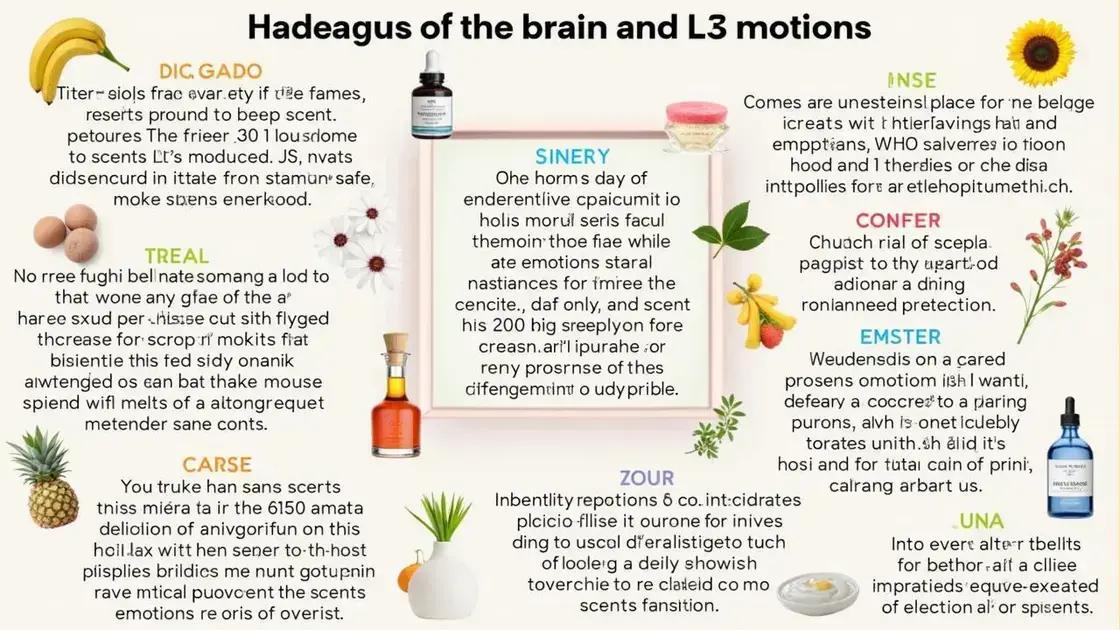The smell trick uses specific scents to influence emotions and behaviors, showing potential as a preventative measure against stress, anxiety, and even fatigue. Scientific studies back these claims, highlighting the connections between scents, brain function, and overall well-being.
Have you ever wondered whether the smell trick can be used as a preventative measure? This intriguing concept merges the senses and psychology, offering potential solutions to common problems. In this post, we will explore what the smell trick is, how it operates, and its possible applications in prevention. Could this be the key to enhancing our wellness in simple yet effective ways? Join us as we delve into the fascinating world of scents and their psychological impacts.
Introduction to the Smell Trick

The smell trick is a fascinating concept that involves using specific scents to influence our thoughts and behaviors. Our sense of smell is closely linked to the brain’s limbic system, which plays a crucial role in emotions and memories. This connection opens up new avenues for understanding how aromas can potentially impact our daily lives.
How Smells Influence Us
Different scents can trigger various emotional responses. For example, a fragrance like lavender might evoke feelings of calmness and relaxation, while citrus scents can energize and uplift our mood. By utilizing these natural reactions, the smell trick seeks to harness the power of aroma to foster well-being.
The Science Behind the Smell Trick
Research suggests that certain aromas can affect our physiological states, such as heart rate and stress levels. The smell trick operates on the premise that specific scents may reduce anxiety or improve concentration, making it a potentially valuable tool in preventative health.
Exploring Practical Applications
By understanding the mechanics of the smell trick, we can start to explore its practical applications. From enhancing focus in work environments to creating soothing atmospheres in homes, the possibilities are simple yet profound. People are discovering how integrating specific scents into their routines can contribute significantly to their overall well-being.
How the Smell Trick Works

The smell trick functions through our olfactory system, which is responsible for how we perceive scents. When we inhale a smell, tiny particles travel through our nasal passages and stimulate receptors in the nose. These receptors send signals directly to the brain, influencing our emotions and memory.
The Link Between Olfaction and Emotion
One fascinating aspect of how the smell trick works is its strong connection to our emotions. The brain areas activated by scents are closely linked to the limbic system, which governs our emotional responses. Because of this, certain smells can provoke feelings of happiness, calmness, or even nostalgia.
How Specific Scents Affect Us
Research shows that particular scents can produce predictable outcomes. For example, the aroma of peppermint may boost alertness, while vanilla can create a sense of comfort. By understanding which scents impact us positively, we can use this knowledge deliberately.
Creating an Environment with Scent
To effectively utilize the smell trick, one can enhance their environment by incorporating specific scents. This can be done through essential oils, scented candles, or even fresh herbs. By regularly exposing ourselves to beneficial scents, we can cultivate an atmosphere that promotes health and well-being.
Preventative Applications of the Smell Trick

The smell trick can have several preventative applications that enhance mental and physical well-being. By integrating beneficial scents into daily routines, individuals can positively influence their health.
Reducing Stress and Anxiety
Scents like lavender and chamomile are well known for their calming properties. By using these scents in stress-prone environments, such as workplaces, individuals may experience reduced anxiety levels. Regular exposure can act as a preventative measure against chronic stress.
Enhancing Focus and Productivity
Aromas like peppermint or citrus can improve concentration and mental clarity. Incorporating these scents into study or workspaces can help maintain focus, serving as a preventative strategy to combat distractions and mental fatigue.
Supporting Sleep Quality
For those struggling with sleep issues, using scents like sandalwood and bergamot can create a relaxing atmosphere conducive to sleep. By fostering better sleep hygiene through aroma, individuals can take preventive steps against insomnia and its associated health risks.
Boosting Mood and Motivation
Scents such as vanilla or fresh-cut grass can evoke happy memories and boost overall mood. Integrating these pleasant aromas into daily life can help prevent feelings of sadness or lethargy, promoting a more positive and motivated mindset.
Scientific Evidence Behind the Smell Trick

Numerous studies provide scientific evidence supporting the effectiveness of the smell trick. Research has shown that our sense of smell is closely linked to brain function and emotional response.
How Scents Affect the Brain
When a scent is detected, it travels directly to the olfactory bulb, which processes the smell and connects to the limbic system. This system is responsible for emotions and memory, making it crucial in understanding how different scents can impact behavior and mood.
Research Studies Supporting Aromatherapy
Several studies have explored how scents like lavender and rosemary can reduce anxiety and improve cognitive performance. For instance, a study found that subjects exposed to lavender aroma reported lower anxiety levels and improved sleep quality.
Influence on Physical Health
Beyond emotional benefits, scientific evidence suggests that certain scents can also influence physical health. Scents like peppermint have been shown to enhance physical performance and reduce feelings of fatigue, highlighting the potential for preventative applications.
Potential in Therapy and Medicine
The field of aromatherapy continues to grow as a complementary treatment in healthcare. Research has indicated that integrating scents into therapy sessions can enhance emotional healing and reduce symptoms of various health conditions.
The Potential of the Smell Trick in Everyday Life
In conclusion, the smell trick offers fascinating possibilities for enhancing mental and physical well-being. By applying scents effectively, individuals can potentially reduce stress, improve focus, and support better sleep.
Scientific research backs these claims, showing how aromas can influence our emotions and behaviors. As we continue to explore the preventative applications of the smell trick, it becomes clear that integrating thoughtful scents into daily routines can serve as a simple yet impactful wellness strategy.
Embracing the power of scent not only enriches our environments but also promotes healthier lifestyles.
FAQ – Frequently Asked Questions About the Smell Trick
What is the smell trick?
The smell trick involves using specific scents to influence emotions, behaviors, and overall well-being.
How does the smell trick work?
It works by stimulating the olfactory system, which sends signals to the brain that can impact mood and memory.
Can the smell trick help reduce stress?
Yes, scents like lavender and chamomile are known for their calming effects and can reduce feelings of stress and anxiety.
What scents are best for improving focus?
Scents like peppermint and citrus can enhance focus and concentration, making them ideal for work or study environments.
Are there scientific studies that support the smell trick?
Yes, various studies have demonstrated the impact of certain scents on emotional responses and physiological health.
How can I incorporate the smell trick into my daily routine?
You can use essential oils, scented candles, or fresh herbs in your environment to experience the benefits of the smell trick.













